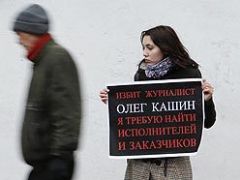Human Rights Voices
While the UN devotes its human rights operations to the demonization of the democratic state of Israel above all others and condemns the United States more often than the vast majority of non-democracies around the world, the voices of real victims around the world must be heard.
MOSCOW - A leading Russian journalist was in a coma on Saturday after two men broke his legs, jaw and fingers in an attack which his editor said was likely to be linked to his coverage of banned opposition groups.
Rights groups have criticized the Kremlin for doing too little to solve a string of journalists' murders that have made Russia one of the most dangerous places in the world for reporters.
Police said they had opened a criminal case over the attempted murder of Oleg Kashin, 30, a political reporter with Kommersant, Russia's best respected general daily newspaper.
"They didn't just rough him up. To make their point they broke the fingers of a journalist," Kommersant editor Mikhail Mikhailin told Reuters. "I'm stunned."
Mikhailin said the motive was unclear, but likely to be linked to Kashin's recent investigations into extremist youth groups, including banned opposition group the National Bolshevik Party.
"He undertook investigations into various informal organizations. I feel something he wrote might have upset someone who decided to take these vicious measures," he said.
Doctors induced a coma after Kashin was admitted to hospital with both his legs broken, a damaged skull and his jaw fractured in two places, Mikhailin said. They would decide on Monday if they could remove him from intensive care, he said.
Shortly after the attack, President Dmitry Medvedev ordered the prosecutor general and interior minister to "take special control of the investigation", the Kremlin said in a statement.
"The criminals must be found and punished," Medvedev said on Twitter.
UNSOLVED MURDERS
Around 40 journalists protested outside the Moscow headquarters of Russia's police force to press for a thorough investigation. "I demand that the perpetrator and mastermind be found," read one banner.
Journalists' rights groups have criticized the Russian authorities for failing to solve a number of high-profile murders of media workers, including the 2006 killing of Kremlin critic Anna Politkovskaya.
The New York-based Committee to Protect Journalists (CPJ) has said it has noted an improvement in recent months, but says much more needs to be done.
There have been 19 unsolved murders of journalists in Russia since 2000, according to CPJ figures. It lists Russia as eighth on its "Impunity Index", a listing of states where journalists are killed regularly and governments fail to solve the crimes.
Kommersant cited witnesses as saying Kashin was attacked in an underpass near his Moscow apartment by the two men who had waited for him with a bunch of flowers.
"It's an attack on someone who was trying to tell the truth," the head of Russia's journalists' union, Mikhail Fedotov, said after the attack. "There is no question it was linked to his work."
Kashin also covered an opposition movement against the building of a road through the protected centuries-old Khimki oak forest on the edge of Moscow.
A local newspaper editor who campaigned against the road spent months fighting for his life after a 2008 beating that resulted in the amputation of a leg and fingers. The road project was eventually suspended by Medvedev.
Journalist rights groups have also demanded an investigation into the apparent 2007 suicide of Kommersant's defence correspondent Ivan Safronov, to see if he was killed.
Kommersant, controlled by a metals billionaire who is widely seen as close to the Kremlin, is relatively independent and offers mild criticism of the authorities.

